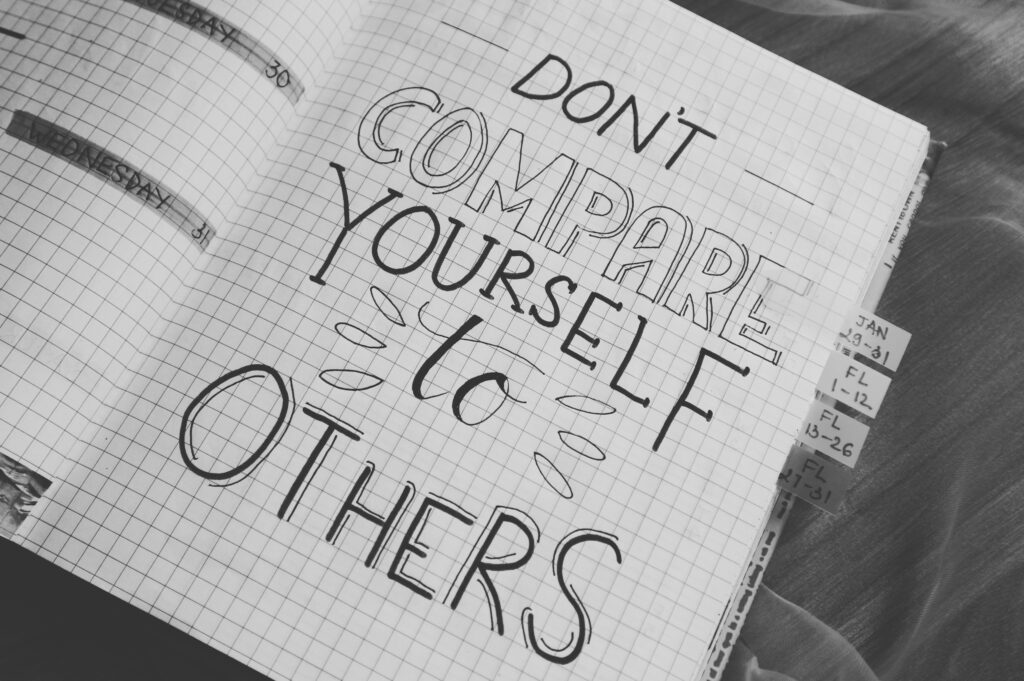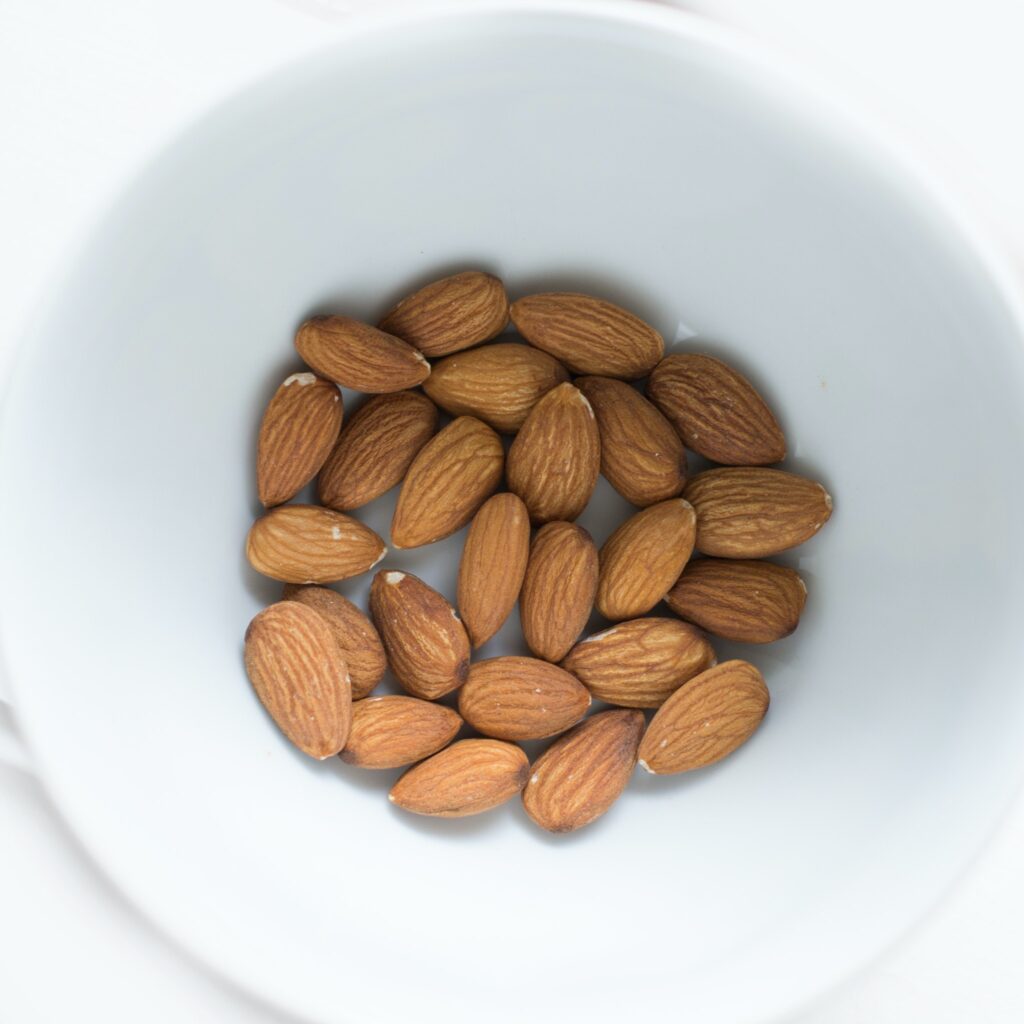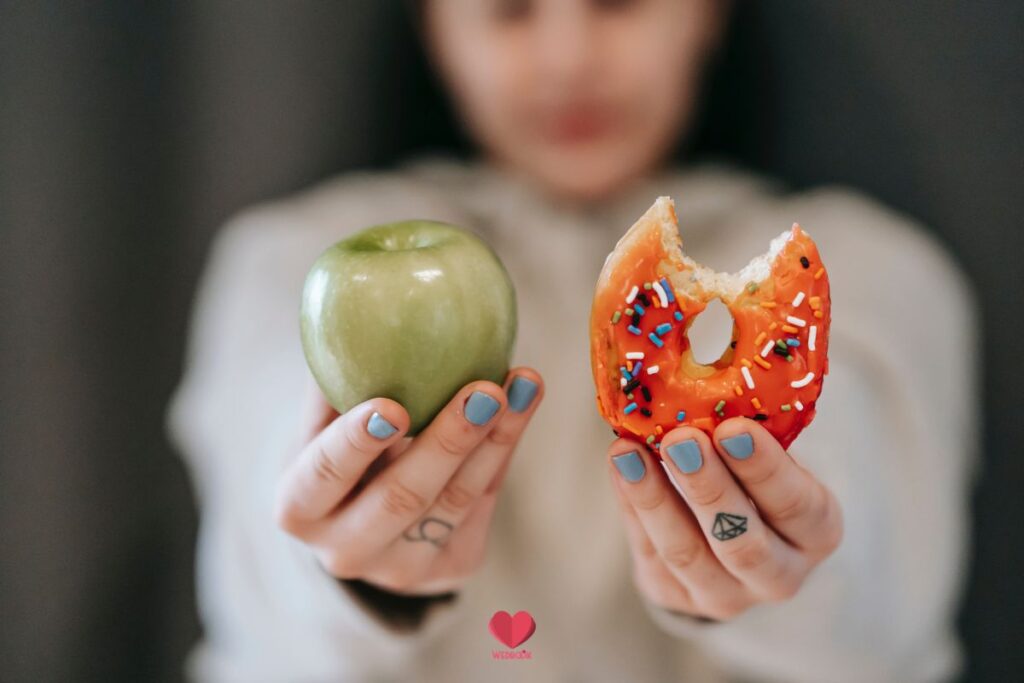Following a wedding diet plan never means you have to starve yourself in order to get into shape. In fact, it’s quite the opposite. It’s all about making small lifestyle changes that give big results in the long term. Small lifestyle swaps like reducing sugar intake, not drinking an extra glass of wine at dinner, or snacking smartly can help you achieve the desired fitness levels before your big day arrives. However, if you’re wondering where to start we have come up with these 21 wedding diet tips to follow along with some of the most common questions regarding the meal plan they should adhere to after their engagement.
#1 Go For A Health Check-Up
Before you go on a wedding diet plan or decide to make any lifestyle changes, it’s a good idea to get a health checkup done especially if you have suffered from deficiencies before or have an underlying health condition. Not to forget, some of the deficiencies like that of Vitamin B12 and Vitamin D can cause sudden hair loss – something you would surely not want to deal with closer to your wedding. Getting a health check-up done gives you an insight into your current health status and identify any potential issues that may need to be addressed before starting a new diet.
During the health checkup, your healthcare provider will review your medical history, perform a physical examination, and might conduct some laboratory tests to assess your overall health. You might also want to tell them about the upcoming lifestyle & diet changes you’re planning to implement and they will be able to provide you with any recommendations that may be necessary depending on your reports. You can also work with a registered dietician when planning your new diet, someone who can help you create a safe and healthy eating plan depending on your individual needs and goals.
#2 Set Realistic Meal & Exercise Plan
Having a realistic pre-wedding diet and exercise plan in place is essential to remain consistent in your routine. Remember that there’s nothing more important than consistency regarding both meal and exercise plans. Consistency can help you achieve your goals and make some healthy changes in the long run. That being said, when setting a meal/ exercise plan, start by assessing where you stand at the present moment. Say you don’t exercise at all, don’t go to the other extreme, and decide you will exercise every day for 60 minutes at least.
Similarly, if you exercise for 2 to 3 days a week, you can increase that upto 4 to 5 days a week, and also increase the duration a bit. The same goes for the intensity. If you have only been doing low-intensity exercises, increase it to moderate training and then HIITs and other high-intensity workouts.
When you’re planning meals, consider your current meal tendencies. If you’re taking two glasses of wine daily with dinner, reduce it to one, and if you’re eating out daily, switch one of the meals to a healthier, balanced order. Lastly, it’s okay if you go out of balance with a meal plan or exercise plan, be flexible. Life can be unpredictable, and it’s important to be flexible and make adjustments as needed.
#3 Avoid Processed Foods
Avoiding processed foods is a good strategy for maintaining a healthy diet. Processed foods are foods that have been altered in some way, such as by cooking, preserving, or adding ingredients, before being sold. Many processed foods are high in added sugars, sodium, and unhealthy fats, and may lack important nutrients like fiber, vitamins, and minerals. Some examples of processed foods lurking around you are savory snacks like crisps, sausage rolls, processed cheese, breakfast cereal, syrups, bakery products, and fast food like french fries and burgers. To make sure you avoid them, you will have to make a conscious choice to eliminate them from your diet but there are a few other tips that can help you stay away from them.
First, shop the perimeter of the grocery store, as that’s where the freshest, least processed foods are found. Second, read the labels and look for foods that have a short list of ingredients, and avoid those with a long list of additives or preservatives. Third, do a meal plan on the weekends so you don’t stray away from the diet on those busy days. And finally, try to eat at home as much as possible. Eating out or ordering takeout often means choosing from a menu of mostly processed foods. Eating at home allows you to have more control over what you eat and can help you avoid processed foods
#4 Include Thermogenic Foods In Your Diet
Thermogenic foods are foods that can increase your body’s metabolism or the rate at which your body burns calories. Some research suggests that certain foods may have a thermogenic effect, meaning they may help your body burn more calories during digestion and metabolism compared to other foods.
P.S.: It is important to note that the thermogenic effect of individual foods may be small, and it is unlikely that any single food will significantly increase your metabolism on its own. However, incorporating a variety of thermogenic foods into your wedding diet plan 6 months as part of may help support weight management efforts.
Some examples of thermogenic foods include:
- Spices & Herbs: Some spices and herbs, such as chili peppers, black pepper, and ginger, may have a thermogenic effect.
- Protein-Rich Foods: It’s been proven that protein-rich foods increase the thermogenic effect due to the energy required to digest and metabolize protein. It also keeps you fuller and satiated for longer.
- Green Tea: Green tea is also research-backed to increase thermogenesis due to the presence of compounds called catechins.
- Coffee: The caffeine in coffee may have a thermogenic effect (research), although the effect may vary from person to person.
- Cocoa: Yup, your beloved chocolate is another thermogenic food (research-backed!). Though, dark chocolate and consumption in controlled proportions is the key to enjoy this benefit.
#5 Mitigate Stress

Stress can affect fat loss in a few different ways. Chronic stress can lead to the production of the hormone cortisol, which can contribute to weight gain, particularly in the abdominal area. Stress can also lead to emotional eating, which can cause weight gain if you are consuming more calories than your body needs. Wedding planning is a recipe for some unnecessary stress in your life, so it’s important to take some actionable steps to mitigate stress when scheduling a wedding diet plan 3 months in advance.
Include stress-reducing activities like exercise, meditation, journaling, or any hobbies like dancing or painting which you find relaxing. All of them have been proven to reduce stress and increase the production of happy hormones like endorphins, oxytocin, dopamine, and serotonin. Having a healthy diet is also key to reducing stress, so include whole foods in your diet and stay away from processed foods. Getting enough sleep is also important. Have a good sleeping routine in place which can include a warm shower, some TLC before sleeping and no gadgets! Lastly, seek support. You can talk to your friends, or your partner, or seek professional help if that’s what’s needed to manage the stress levels.
#6 Have Your Cheat Days In Check!
A cheat day is when you allow yourself to eat whatever you want, regardless of whether it fits into your current diet plan. People incorporate cheat days into their wedding diets so as to stay motivated or to reward themselves for sticking to their diet. Cheat days, though, can be a tricky concept as you can overdo the calorie deficit easily if you’re not careful enough. Especially when someone follows a wedding crash diet and tends to go overboard when they have a chance. It’s best to keep track of your calories on those cheat days or you can have a cheat meal instead of a cheat day to ensure you stay in the calorie deficit.
There is no one-size-fits-all answer to whether cheat days are helpful or harmful during a diet. It ultimately depends on your individual goals and the context in which you are using cheat days. Ultimately, it is important to find a balance that works for you and meets your individual goals and needs. If you do choose to include cheat days in your diet, it is important to be mindful of portion sizes and not overindulge. It may also be helpful to work with a registered dietitian or healthcare provider to create a healthy eating plan that meets your needs.
#7 Combine Your Diet With Exercise
Honestly, diet matters more than exercise when you’re planning to lose weight. You can simply lose the extra pounds by going on a calorie deficit by reducing your portion size or reducing unhealthy food choices. But to keep the weight off, it’s important to combine your wedding diet plan for 6 months with an appropriate exercise plan. Physical activity automatically increases caloric expenditure and you can easily lose weight without changing your diet at all! Given that your diet already is well-balanced and includes healthy foods. Both diet and exercise are important for overall health and well-being. It is generally recommended to focus on both when trying to improve your health or wanting to lose weight!
When zeroing in on your wedding diet plan, do include a consistent exercise routine. It doesn’t have to take much of your time. Studies suggest that even 150 minutes of moderate-intensity physical activity or 75 minutes of vigorous-intensity physical activity per week, in addition to following a healthy diet is enough to achieve your weight loss goals. You can choose an exercise routine you like as it makes it easier to stay consistent. Some great options include yoga, Zumba, pilates, ballet, swimming, etc.
#8 Avoid Crash Diets
A wedding crash diet sounds like a convenient option. Think about it, you can lose weight in a week or so and you don’t have to work on any lifestyle changes in advance. It sounds convenient, but it’s really bad for your health. One reason is most of your weight loss will be from lean muscle and water, and not fat itself. Secondly, your metabolism slows down so when you start eating expect to gain not just the weight you’ve lost but more than what you had before. Third, you’re just gambling with your health. Crash diets deplete your body of essential nutrients which can take a lot of time to recover afterward. We can go on & on about why a wedding crash diet is never a good idea and why you shouldn’t opt for them. Having said that, there are some ways to lose weight fast if you’re desperate!
Say you have a month left before the special day, now is the time to get serious about your wedding diet plan and exercise routine. Reduce 500 calories from your diet and include healthy, protein-rich foods in every meal. Up your exercise intervals (not the intensity initially), but the time you exercise. Forget about cheat days or cheat meals if you want to lose weight fast before the wedding. They will only add to your calories and you’d not be able to see the desired results on the scale. Get more sleep and reduce stress during this time period. And remember, if you suffer from any nutritional deficiencies, don’t exclude foods that have these nutrients and add supplements to make for any loss.
#9 Have Protein-Rich Foods
It has been proven that protein-rich diets not only help in reducing body weight but also help lose more fat and preserve fat-free mass in both low-calorie and standard-calorie diets. Long-term studies done over a period of 6 months to 12 months have also shown that fat loss by a protein-rich diet also prevents weight regain by weight loss. More benefits of having a protein-rich diet include changing the makeup of the gut-derived hormone so you have increased satiety and reduced food intake. Not to forget, protein-rich foods also increase the body’s thermogenic effect so you burn more calories in the short run and experience a better metabolism in the long run.
Here are a few examples of protein-rich foods that may support weight loss:
- Lean meats: Examples include chicken, turkey, and lean cuts of beef and pork.
- Fish and seafood: Examples include salmon, tuna, and shrimp.
- Eggs: Eggs are a good source of protein and can be incorporated into a variety of dishes.
- Beans and legumes: Examples include lentils, chickpeas, and black beans.
- Tofu: Tofu is a plant-based source of protein that can be incorporated into a variety of dishes.
- Nuts and seeds: Examples include almonds, peanuts, and chia seeds.
#10 Don’t Be Hard On Yourself

Having a new diet and exercise routine in place can be challenging and it’s easy to be hard on yourself when you don’t see desired results on the scale. When you don’t see the desired results, it’s important to not be too hard on yourself and create an extreme routine that you won’t be able to stick to consistently anyway. Instead, stay realistic and kind to yourself. Not everyone has the same results with a similar diet or exercise routine. So, don’t compare with anyone else who has had different results with the same routine. When you’re going to the gym, it’s easy to fall into the trap of comparison. It’s during this time when you need to focus on the progress you’ve made and not the small imperfections. Find some healthy ways to cope with stress like meditation, journaling, or speaking to someone who’d understand. Stress can easily lead to emotional eating, so it’s important you mitigate it as soon as possible.
Most importantly, by focusing on progress and being kind to yourself, you can support a healthy relationship with food and your dieting journey. It is always a good idea to seek support from a healthcare provider or registered dietitian if you are struggling with your diet or feeling overwhelmed. They can provide guidance and support to help you achieve your goals.
#11 Hydrate
Hydration can support your weight loss goals, and can also promote healthy hair and glowing skin. Drinking water can support weight loss in a number of ways. It naturally suppresses your appetite by making you feel fuller and satiated for longer. Oftentimes, the body mistakes dehydration for hunger, and drinking water before eating something can help in suppressing the dehydration and you end up eating only what you’re supposed to! Drinking water can also increase your metabolism. A 2013 study on 50 girls proved when the subjects drank 2 cups of water half an hour before breakfast, lunch, and dinner, they ended up losing weight without any other significant dietary changes.
Water can also reduce your calorie intake from other beverages like sweetened shakes, tea, coffee, or soda. It is generally recommended to aim for at least 8 cups (64 ounces) of water per day. Water is the best choice for hydration, but you can also get fluids from other beverages, such as unsweetened tea, coffee, and low-fat milk, and from foods, such as fruits and vegetables. Some fruits and vegetables are also high in water like cucumber, peaches, apples, celery, capsicum, tomatoes, peaches, broccoli, and lettuce.
#12 Create Doable Meal Plans
Meal planning is quite important for your weight loss journey. Once you’ve planned meals for the week, it’s easier to stick to your wedding diet plan and not consume unnecessary calories and processed foods just because you weren’t prepared. Having said that, it’s important to consider that meal planning should be quite personalized and should contain foods that meet your nutrition and caloric requirements. So, don’t just stick to any one of the wedding diets you find online. Instead, work on a personalized program to meet your individual needs and preferences. Here are a few factors to consider when you’re meal planning for your wedding diet plan for 3 months.
- Focus On Whole, Unprocessed Foods: A diet that includes a variety of whole, unprocessed foods, such as fruits, vegetables, whole grains, and lean proteins, can support weight loss and overall health
- Control Portion Sizes: Paying attention to portion sizes can help you control your calorie intake and support weight loss. It may be helpful to use measuring cups or a food scale to ensure that you are consuming appropriate portions
- Plan Ahead: Meal planning can help you make healthier food choices when you are short on time or tempted to make less healthy choices. Consider preparing meals and snacks in advance so that you have healthy options available when you need them.
- Include Protein: Protein can help you feel full and satisfied, which may aid in weight loss. Aim to include protein in each meal and snack.
#13 Practice Mindful Eating
Mindful eating is a practice that involves being present and paying attention to your thoughts, feelings, and physical sensations while eating. It involves taking the time to enjoy your food and being mindful of your hunger and fullness cues. Several studies have shown that mindful eating can contribute to healthier eating habits like reaching out for fruits instead of packeted snacks, reducing emotional eating and binge eating, and lessening the chances of overeating. Practicing mindful eating can help you develop a healthy relationship with food and improve your overall health and well-being.
Here are a few tips for practicing mindful eating:
- Eat without distractions: Turn off the TV, put away your phone, and focus on your food.
- Slow down: Take small bites and chew your food slowly. This can help you feel more satisfied and prevent overeating.
- Pay attention to your hunger and fullness cues: Stop eating when you are comfortably full, rather than stuffed.
- Choose foods that you enjoy: Choose foods that you enjoy and that nourish your body. Don’t worry about being perfect, just focus on making healthy choices most of the time.
- Be present: Notice the colors, smells, and textures of your food. Pay attention to the flavors and the sensation of eating.
#14 Focus On An Active Lifestyle
Being physically active supports your weight loss journey and also gives you a healthier lifestyle to practice in the long run. Small changes like taking a walk to go somewhere near to you, choosing stairs instead of life, or choosing to brisk walk when you’re on the phone are all some simple ways to practice an active lifestyle. Of course, exercising forms the main basis of an active lifestyle, but these smaller changes can add to the calorie deficit even when you do moderate exercise just 3 to 4 times a week. It’s the overall routine that matters!
Besides weight loss, an active lifestyle also helps to improve cardiovascular health and reduce the risk of chronic diseases, such as obesity, heart disease, and type 2 diabetes. In the longer run, it also improves your metabolism, which can make it easier to maintain your weight loss. An active lifestyle also reduces stress, and chronic stress makes your body hold onto fat and stops it from releasing from the fat stores. Remember to listen to your body and start gradually when you’re new to exercise. Take it slow and choose activities that you enjoy and that are appropriate for your fitness level.
#15 Have Someone Check On Your Diet & Exercise Routine

Having someone who will support you, keep you in check, or better accompanies you in your exercise can be a great way to stay consistent. You can rope in your bridesmaid or better, your partner who’d also be wanting to get in shape for the wedding day! This will help you both spend some quality time together through this precious engagement period. Though it’s important to remember everyone has different and when you create an exercise routine with someone, it’s best to discuss your individual goals and come to a common routine practice that works for both of you!
Here’s why exercising with a friend or your partner can support consistency:
- Motivation: Having a workout partner can provide motivation and encouragement, which can help you stick with your exercise routine.
- Accountability: Having someone else relying on you to show up for a workout can increase accountability and make it more likely that you will follow through with your exercise plans.
- Fun: Exercising with a friend or group can be more enjoyable and can make the time pass more quickly.
- Variety: Exercising with a friend or group can also provide an opportunity to try new activities and keep things interesting, which can support consistency.
#16 Snack Smartly
While some wedding diet plans will completely give a no-no to snacks, healthy snacking can, in fact, be beneficial to your weight loss plan. Snacking can help curb hunger so you don’t inhale your dinner after a long time of no food. Though it’s important to choose snacks that are nutrient-dense so you don’t choose foods and beverages that are high in calories, fat, and sugar, such as chips, cookies, and soda, which can contribute to weight gain. You also need to portion control your snacks and not eat too much in one go! Instead, just snack once or twice throughout the day in between two bigger meals. Here are a few examples of good nutrient-rich snacks.
- Fruits and vegetables: These can be eaten on their own or paired with a protein source, such as nuts or cheese.
- Nuts and seeds: These can be a good source of protein, healthy fats, and fiber. Just be sure to watch portion sizes as they are high in calories.
- Greek yogurt: Greek yogurt is a good source of protein and can be paired with fruit or mixed with nuts and seeds for a satisfying snack.
- Hard-boiled eggs: Eggs are a good source of protein and can be a convenient snack option when paired with a piece of fruit or a small serving of vegetables.
- Hummus and veggies: Hummus is a good source of protein and can be paired with vegetables, such as carrots, bell peppers, and cucumbers, for a satisfying snack.
- Edamame: Edamame is a good source of protein and can be a satisfying snack when paired with a small serving of nuts or seeds.
#17 Cut Down On Alcohol
If you’re trying to boost your weight loss goals, it’s a good idea to cut back on alcohol as even a single serving of alcohol can add around 150 calories without any nutrition. Add to that sweetened juices and sodas and you have a calorie intake of around a meal without any nutrition. If you’re someone who does love their glass of wine after dinner, it’s a good idea to reduce it to every other day and adjust the calories from wine by creating a calorie deficit through other dietary changes. You can surely enjoy alcohol in moderation, and we have included a few tips below to incorporate alcohol into a weight-loss plan.
- Choose lower-calorie options: Light beers, dry wines, and cocktails made with low-calorie mixers, such as seltzer or diet soda, can be lower in calories than other alcoholic beverages.
- Pay attention to portion sizes: It is important to pay attention to portion sizes and limit your alcohol intake to no more than one drink per day for women and two drinks per day for men.
- Don’t drink on an empty stomach: Eating before or while you drink can help slow the absorption of alcohol and reduce the risk of overconsumption.
- Avoid high-calorie mixers: Mixers, such as sweetened juices and syrups, can add a lot of extra calories to your drink. Choose low-calorie mixers, such as seltzer or diet soda, instead.
#18 Practice Good Sleep Hygiene
There are many (many!) studies that have proven how a good night’s sleep can have a substantial effect on your weight loss goals. One study concluded that people who sleep for just one extra hour in the morning ended up eating 270 calories fewer calories throughout the day. Another paper concluded that the lack of quality sleep increases the desire for higher-calorie and carbohydrate-rich foods associated with weight gain. A similar finding was concluded by another research paper, which concluded people with sleep deprivation chose bigger portions of all foods. Studies have also found a link between the lower quality of sleep and metabolic dysregulation.
Practicing good sleep hygiene while following any wedding diet plan is imperative. To improve your sleep quality, set a consistent wake-up time and bedtime. Practice soothing activities before going to sleep. This can be anything from a warm shower to journaling your thoughts or meditating. Avoid phones or any other gadgets as the blue screen can interfere with your body’s production of melatonin. Also, avoid caffeine close to your bedtime as it can interfere with your sleep pattern too!
#19 Be In A Calorie Deficit
Being in a calorie deficit means that you are consuming fewer calories than your body needs to maintain its current weight. This can help you lose weight. Weight loss occurs when you create a calorie deficit by consuming fewer calories or increasing the number of calories you burn through physical activity. The number of calories you need each day depends on factors such as your age, gender, weight, height, and level of physical activity. It is generally recommended to aim for a moderate calorie deficit of 500-750 calories per day to support weight loss. This can typically result in a weight loss of 1-2 pounds per week, which is a safe and sustainable rate of weight loss.
It is important to note that weight loss is not necessarily the same as fat loss. While weight loss may involve a reduction in both fat and muscle mass, it is generally recommended to focus on losing fat while maintaining muscle mass. This can be achieved through a combination of a healthy, calorie-controlled wedding diet and regular physical activity.
#20 Start Your Day Right

Eating healthy foods early in the morning helps you start your day right and sets the food choices for the rest of the day. In general, you should eat something agreeable and healthy on an empty stomach like soaked almonds, watermelon, honey with water, or wheatgrass powder with warm water. You can also drink a healthy concoction made with amla, ginger, and turmeric, but know that the same thing which is working for someone else may not work for you. So, choose a food or beverage that makes your feel good. You should also have your breakfast as early in the morning as you can. Preferably, right after you exercise and take a shower. Having a healthy, protein-rich breakfast replenishes your energy levels, supports weight management and provides fuel for your day ahead.
#21 Include Healthy Fats In Your Diet
Fats are an important part of a healthy diet and can be included in a weight loss plan. However, it is important to pay attention to portion sizes and choose fats that are appropriate for your calorie needs. Some types of fats may be more beneficial for weight loss than others. For example, monounsaturated fats and polyunsaturated fats, such as those found in olive oil, nuts, and seeds, can be healthy choices for weight loss. These types of fats may help reduce the risk of heart disease and improve blood sugar control.
Saturated fats, on the other hand, maybe less beneficial for weight loss. These types of fats are found in animal products, such as meat and dairy, and are also found in some plant-based sources, such as coconut oil and palm oil. Consuming too much-saturated fat may increase the risk of heart disease and contribute to weight gain. It is generally recommended to limit saturated fat intake and focus on incorporating monounsaturated and polyunsaturated fats into the diet. However, it is important to remember that all fats should be consumed in moderation as part of a balanced diet.
FAQ’s
When should you start dieting for a wedding?
It is generally recommended to start a weight loss plan well in advance of a wedding to allow adequate time to make gradual, sustainable changes to your diet and lifestyle. That’s why a wedding diet plan 6 months and a wedding diet 3 months are the most popular. Starting early ensures that you are able to achieve your weight loss goals in a healthy, sustainable way. If you are considering starting a weight loss plan in preparation for your wedding, it is a good idea to speak with a healthcare provider or registered dietitian. They can help you determine how much weight you may need to lose and create a plan that is safe and appropriate for your individual needs and goals.
It is important to remember that rapid weight loss, such as through a wedding crash diet, is not generally recommended as it is not sustainable and can have negative effects on your health. Instead, focus on making gradual, sustainable changes to your diet and lifestyle, such as increasing your intake of fruits, vegetables, and whole grains, and increasing your physical activity levels. It is also important to manage stress and practice self-care in the lead-up to your wedding. This can help ensure that you are able to enjoy the planning process and the special day itself.
Do women with a fast metabolism need to diet for weddings?
Whether or not a person with a fast metabolism needs to diet for a wedding will depend on their individual circumstances, such as their current weight, their weight loss goals, and their overall health. It is generally recommended to focus on a healthy, balanced diet that includes a variety of nutrient-rich foods, rather than trying to lose weight rapidly. This can help ensure that you are able to maintain your weight or shed a few pounds – whatever your goal – in a safe and sustainable manner.
How To Lose Weight For A Wedding In 3 Months?
There are many wedding diet plans for 3 months available. Plus, 3 months is a good amount of time to have a diet & exercise routine in place, follow them consistently, and see some considerable results by the time of your wedding.
Here are a few tips for losing weight in the lead-up to your wedding:
- Consult a healthcare provider or registered dietitian: They can help you determine how much weight you may need to lose and create a plan that is safe and appropriate for your individual needs and goals.
- Focus on a healthy, balanced diet: This should include a variety of nutrient-rich foods, such as fruits, vegetables, whole grains, and lean proteins.
- Increase physical activity levels: Regular physical activity can help support weight loss and improve overall health. Aim for at least 150 minutes of moderate-intensity activity or 75 minutes of vigorous-intensity activity per week.
- Manage stress: Stress can interfere with weight loss, so it is important to find healthy ways to manage stress, such as through exercise, meditation, or talking to a friend or family member.
- Practice self-care: Make sure to take time for yourself and prioritize self-care in the lead-up to your wedding.
What Should I Eat 10 Days Before My Wedding?

First, it’s not a good idea to crash diet before weddings as it can have a major impact on your health and also show visible results physically in terms of lower energy levels, less glowing skin, and hair shedding. You will also feel these negative impacts later on after the wedding. So, it’s best to stick to a healthy wedding diet so closer to the big day. Include protein-rich and fiber-rich foods in your diet and plenty of fresh produce. Don’t forget to hydrate and drink at least 3 to 4 liters of water daily. You can include a workout in your routine but stick to the one that you already have practiced. You don’t want any unnecessary injuries or soreness closer to your special day.
How Can I Debloat Before My Wedding?
There are several strategies that you can try to help reduce bloating in the lead-up to your wedding:
- Drink plenty of water: Adequate hydration can help flush out excess fluids and reduce bloating. Aim for at least 8-8 ounces of water per day.
- Eat a healthy, balanced diet: A diet that is high in fiber and low in salt can help reduce bloating. Include a variety of fruits, vegetables, whole grains, and lean proteins in your diet.
- Avoid gas-producing foods: Some foods, such as beans, cruciferous vegetables (such as broccoli and cabbage), and carbonated drinks, can cause bloating. Avoiding or limiting these types of foods may help reduce bloating.
- Get regular exercise: Physical activity can help improve digestion and reduce bloating. Aim for at least 150 minutes of moderate-intensity activity or 75 minutes of vigorous-intensity activity per week.
- Manage stress: Stress can interfere with digestion and contribute to bloating. Find healthy ways to manage stress, such as through exercise, meditation, or talking to a friend or family member.





